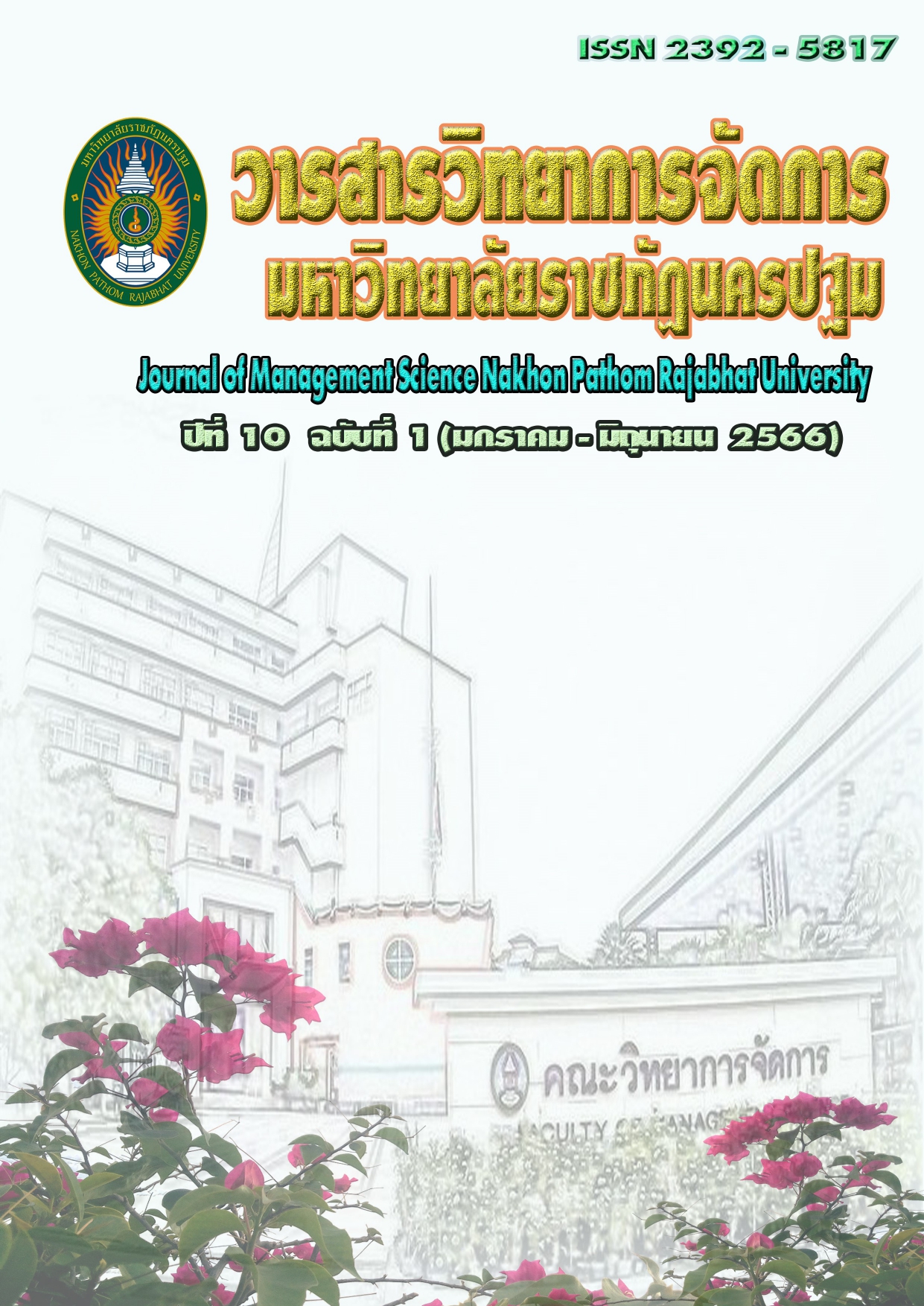Strategy for Change Agent Driving towards Strong Community Building under the Context of Urban Community in Metropolitan Area
Main Article Content
Abstract
The objectives of this research were 1) to study the components affecting the change agent driving; 2) to study the environment data that related to the change agent driving; and 3) to analyze and formulate a strategy for driving change agent towards strong community building under the context of urban community. The mixed-methodology was conducted in this research, the sample groups and key informants used in this research consisted of 1) community leaders who have participated in the strengthening and developing change agent project; and 2) stakeholders in the area or nearby communities. The quantitative research was conducted by questionnaire from 162 samples. The qualitative research was conducted by in-depth interview and focus group discussion from 84 key informants. This research analyzed data by descriptive statistics, stepwise linear multiple regression analysis, content analysis, and SWOT analysis.
The results revealed that four components consisted of Transformational Leadership; Networking; Food Security; and Community Management had affected to the change agent driving towards building strong communities. Also, the study found important findings as follows: 1) participation enhancement; 2) food security building; 3) network integration; 4) “Leader must do first” conduction; 5) people encouragement; 6) social adaptation; 7) next generation leader promotion; 8) public awareness; 9) thought leader searching; and 10) community fund seeking. These findings used for formulating strategies in 4 aspects as follows: 1) integrating workspaces 2) founding support systems 3) enhancing leader capabilities and 4) creating innovations for community driving. The important recommendations are as follows: 1) emphasize on networking to operation support; 2) adapt the activity according to various situations and social land scapes; and 3) strategies or innovative model should be applied for driving change agents to cover all areas widely.
Article history: Received 27 October 2022
Revised 14 June 2023
Accepted 19 June 2023
SIMILARITY INDEX = 4.87 %
Article Details

This work is licensed under a Creative Commons Attribution-NonCommercial-NoDerivatives 4.0 International License.
The views and opinions of the article appearing in this journal are those of the author. It is not considered a view and responsibility of the editorial staff.
References
กฤษฎา ตันเปาว์. (2564). การจัดการสมัยใหม่ POLC ด้วยสังคหวัตถุ 4. [ออนไลน์]. ค้นเมื่อ 1 กันยายน 2565. จาก http://www.thaiall.com/web2/key.php?topic=kritsada_fband id=28/
กรมการพัฒนาชุมชน. (2564). เอกสารประกอบการประชุมโครงการเสริมสร้างและพัฒนาผู้นำการเปลี่ยนแปลง. กรุงเทพฯ: ศูนย์วิทยบริการ สถาบันการพัฒนาชุมชน.
คณน ไตรจันทร์ ธีรศักดิ์ จินดาบถ และ อนุวัต สงสม. (2559). องค์ประกอบความมั่นคงทางอาหารระดับครัวเรือนในพื้นที่สามจังหวัดชายแดนภาคใต้. KASETSART JOURNAL OF SOCIAL SCIENCES, 38(2), 577-587.
ชยาภาภรณ์ ทองบ่อ. (2562). อิทธิพลของภาวะผู้นำการเปลี่ยนแปลงต่อประสิทธิผลการบริการฃสาธารณะขององค์กรปกครองส่วนท้องถิ่นในเขตอำเภอนาแก จังหวัดนครพนม. วิทยานิพนธ์. ปริญญามหาบัณฑิต. สาขารัฐประศาสนศาสตร์. มหาวิทยาลัยราชภัฏสกลนคร.
ปรียาภา เมืองนก. (2557). กระบวนการบริหารจัดการชุมชนเมืองที่นำไปสู่ชุมชนเข้มแข็ง: กรณีศึกษา ชุมชนหมู่บ้านจัดสรรเขตปริมณฑล. วิทยานิพนธ์. ปริญญามหาบัณฑิต. สาขาการพัฒนาชุมชน คณะสังคมสงเคราะห์ศาสตร์. มหาวิทยาลัยธรรมศาสตร์.
รงค์ บุญสวยขวัญ. (2562). การบริหารการเปลี่ยนแปลง: กรอบแนวคิดเพื่อการวิจัย. Asian Journal of Arts and Culture, 17(1), 39-62.
รพีภัทร์ สุขสมเกษม. (2559). ปัจจัยที่มีผลต่อการส่งเสริมความเข้มแข็งของชุมชนกรณีศึกษาชุมชนในเขตเทศบาลนครปากเกร็ด จังหวัดนนทบุรี. การค้นคว้าอิสระ. ปริญญามหาบัณฑิต. สาขาบริหารรัฐกิจและกิจการสาธารณะ. คณะรัฐศาสตร์ มหาวิทยาลัยธรรมศาสตร์.
วุฒิชัย สายบุญจวง. (2561). ชุมชนเข้มแข็งในทัศนะของชาวชุมชน กรณีศึกษา บ้านปลายคลองบางโพธิ์เหนือ หมู่ที่ 3 ตำบลบางโพธิ์เหนือ อำเภอสามโคก จังหวัดปทุมธานี. วารสารวไลยอลงกรณ์ปริทัศน์ (มนุษยศาสตร์และสังคมศาสตร์), 8(1), 119–129.
สหประชาชาติ (ประเทศไทย). (2558). เป้าหมายการพัฒนาอย่างยั่งยืนของประเทศไทย. [ออนไลน์]. ค้นเมื่อ 1 กันยายน 2565. จาก https://www.un.or.th/globalgoals/th/the-goals/
สำนักงานคณะกรรมการพัฒนาการเศรษฐกิจและสังคมแห่งชาติ. (2560). ยุทธศาสตร์ชาติ พ.ศ. 2561 – 2580 (ฉบับย่อ). กรุงเทพฯ: สำนักงานเลขานุการของคณะกรรมการยุทธศาสตร์ชาติ.
อรุณรุ่ง เอื้ออารีสุขสกุล และ ธีระวัฒน์ จันทึก. (2559). ภาวะผู้นำการเปลี่ยนแปลง : เปลี่ยนความท้าทายมุ่งสู่ความสำเร็จขององค์กรอย่างยั่งยืน. วารสารอิเล็กทรอนิกส์ Veridian มหาวิทยาลัยศิลปากร, 9(1), 845-860.
Allen, L. A. (1958). Management and organization. New York: McGraw-Hill.
Bass, B.M. and Avolio, B.J. (1994). Improving Organization Effectiveness Through Transformational Leadership. California: Sage.
Eggers, W. D. (2003). Governing By Network: The New Shape of the Public Sector. Bangkok: Office of the Civil Service Commission.
FAO. (2006). Food Security (Policy Brief). Rome: FAO’s Agriculture and Development Economics Division.
Kaiser, M. L., Usher, K. and Spees, C. (2015). Community Food Security Strategies:
An Exploratory Study of Their Potential for Food Insecure Households with Children. Journal of Applied Research on Children: Informing Policy for Children at Risk, 6(2), 1-38.
Koul, L. (1984). Methodology Of Educational Research. New Delhi: Vani Education Book.
MacMillan, J.H. and Schumacher, S. (2001). Research in Education. A Conceptual Introduction. (5th ed.). Boston: Longman.
Yamane, T. (1973). Statistics: An Introduction Analysis. New York: Harper International Edition.


